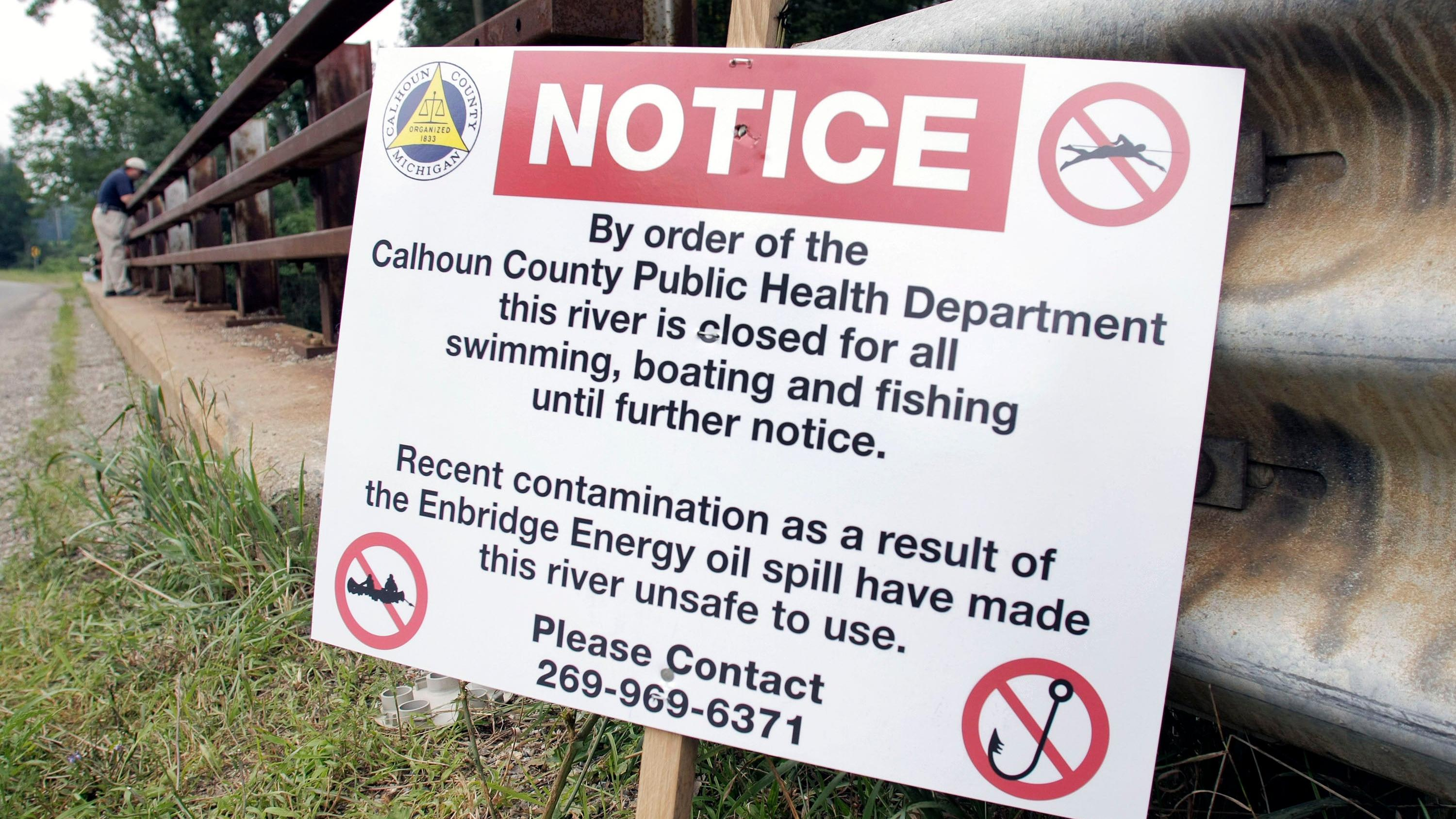As One Pipeline Struggles To Reopen, Another Defies Order To Shutdown
Enbridge Energy, the Canadian company that are still being huge dicks about forcing a pipeline through Native American lands, is also battling Michigan Governor Gretchen Whitmer over the aging Line 5, which runs right under the Straights of Mackinac between Lake Huron and Lake Michigan.
Enbridge Mainline System operates one of the largest pipeline systems in the world with 3,000 miles of pipeline corridors in the United States and Canada. The company doesn't have a good reputation in the state of Michigan or, really, anywhere else. Ten years ago, a pipeline run by the company dumped over 1.2 million gallons of oil into the Kalamazoo River. The cleanup took years and polluted waterways from Western Michigan to Illinois.
Such a spill from Line 5 would be devastating for the Great Lakes region, potentially poisoning huge swaths of the largest fresh water system on the planet. Whitmer revoked the easement that allows Pipeline 5 to rest on the bottom of the Great Lakes and gave Enbridge 180 days to shut down the line. The deadline is Wednesday, but it looks like the company is going to refuse to comply, Bridge Michigan reports:
In the six months since Gov. Gretchen Whitmer gave Enbridge 180 days to stop transporting petroleum across the tempestuous waterway that links Lakes Michigan and Huron, and the four months since Enbridge vowed to defy her, state officials have been adamant that the order still stands.
But as for what Michigan can or will do if Enbridge keeps the oil flowing beyond midnight on Wednesday?That's unclear.Spokespeople for the governor declined to answer questions about their plans, but supplied a written statement noting that Whitmer "stands behind her decision" to cancel the easement that first gave Enbridge's predecessor permission to build a pipeline along the sandy bottom of the straits 68 years ago.
"We cannot risk the devastating economic, environmental, and public health impacts of a catastrophic oil spill in the Great Lakes," the statement reads.
Enbridge says it won't be shutting down Line 5 unless a judge or regulator orders them to do so, which is highly unlikely, Bridge reports. In fact, the company thinks it's actually Michigan that is violating the law by demanding the shutdown, Ryan Duffy, a spokesperson for Enbridge told Bridge:
"Part of the easement agreement is that if there's something that's found that the state believes is an issue or a safety issue, they would let us know about it, and then we have a certain amount of time to fix it," Duffy said.
By the time a safety issue is identified, it may be too late to prevent polluting waterways, as was the case with the 2010 Enbridge pipeline spill. Enbridge has one of the worst safety records in the industry, Duluth News Tribune reports, with 1,068 spills that dumped 7.4 million gallons of oil between 1999 and 2013. And Enbridge hasn't always been forth coming about its own spills. The company took a year to alert Wisconsin state regulators of a spill of 1,386 gallons of a diluted hazardous substance which polluted drinking water wells in Fort Atkinson, Wisconsin, the News Tribune reports.
Even Enbridge acknowledges the company would never be allowed to build a pipeline in such an environmentally delicate area today while, at the same time, insisting the nearly 70-year-old pipeline is safe. Environmentalists and native people, who hold fishing and hunting rights in the area, are demanding some consequences for Enbridge thumbing its nose at Whitmer's order:
On Thursday, the 181st day since Whitmer's Nov. 13 shutdown order, the groups say they'll deliver "eviction notices" to the company's offices in Mackinaw City and Lansing. It's a purely symbolic gesture, said David Holtz, spokesperson for the anti-Line 5 coalition Oil & Water Don't Mix.=
Holtz' group was among those that pressured Whitmer for months to revoke the easement. Achieving that milestone only to watch Enbridge keep the oil flowing, Holtz said, would be a disappointment.
But "we are going to continue holding Enbridge accountable," he said.
In interviews with Bridge Michigan and Michigan Radio, Holtz and other Line 5 opponents called upon state and federal regulators to step in.
"There has to be a consequence for ignoring the law," Holtz said.
Pipeline 5 is a ticking time bomb, and who knows when, if ever, it will be defused. But for a company with little regard for natural resources, native people's rights or even the health and safety of the communities it operates in, the crude must, and will, keep on flowing.
